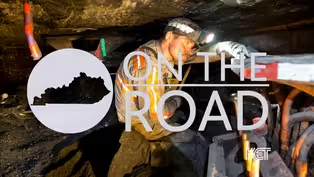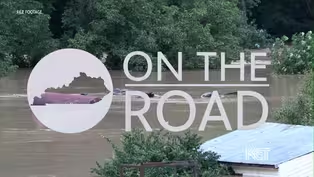
From the Holocaust to the Hollers
Clip: Season 2 Episode 18 | 7m 41sVideo has Closed Captions
Renee Shaw sits down with Eastern Kentucky Luminary John Rosenberg.
Renee Shaw sits down with Eastern Kentucky Luminary John Rosenberg.
Problems playing video? | Closed Captioning Feedback
Problems playing video? | Closed Captioning Feedback
Kentucky Edition is a local public television program presented by KET

From the Holocaust to the Hollers
Clip: Season 2 Episode 18 | 7m 41sVideo has Closed Captions
Renee Shaw sits down with Eastern Kentucky Luminary John Rosenberg.
Problems playing video? | Closed Captioning Feedback
How to Watch Kentucky Edition
Kentucky Edition is available to stream on pbs.org and the free PBS App, available on iPhone, Apple TV, Android TV, Android smartphones, Amazon Fire TV, Amazon Fire Tablet, Roku, Samsung Smart TV, and Vizio.
Providing Support for PBS.org
Learn Moreabout PBS online sponsorshipPreston's Berg.
Attorney and civil rights advocate John Rosenberg has called Appalachia home for more than 50 years.
A survivor of the Holocaust, Rosenberg is the founder of Apple Read a research and defense fund that's provided free legal services to many low income families in eastern Kentucky.
He and his wife, Jean are considered Kentucky luminaries who have been champions for education and human rights since their arrival in the Bluegrass State.
At 91 years old, Rosenberg tells our Rene Shore that he's still working to help the poor and vulnerable and talks of the progress the Appalachian region he calls home has made.
I remember, you know, Governor Andy Beshear has talked about you, and he had said what's so remarkable about John is that he took one of the most traumatic, horrific experiences anyone could go through, and he turned his anger and pain into a lifetime of compassion and service.
Do you view your life as one that has rendered compassion and service?
And what else would you add to that?
I don't know that you ever characterize how you try to be helpful to people.
It's really a privilege, I think, to have lived in this country and to have been able to you know, I'm very fortunate to be a lawyer.
Low income people have lots of legal needs, and we've had serious issues on all the ones from day one.
The problem of trying to make the black lung system more, more helpful to coal miners.
It's always been very difficult for coal miners to get black federal, black lung, even workers compensation in Kentucky over the years and the problems coal miners have had, especially in nonunion coal mines with mine safety.
Some of that's gotten better from time as the administration with Mine Safety and Health Administration has had its ups and downs.
But coal, mine, health and safety has been very important to me, and I'm glad we've been able to help with that.
And as a lawyer, I've been able to help organize this Apple road in eastern Kentucky.
It's been many years now since I was a director.
I'm still the emeritus director, but I'm and I'm glad that in here, more recently, we've started to get some additional funding and particularly federal money.
And we're glad that we can get some state funding for that.
And we started a nonprofit, a separate nonprofit in Whitesburg, the Appalachian Citizens Law Center, that's basically taken over much of the coal related work that Apple did for many years, so that Apple roots lawyers can concentrate on the poverty issues that that permeate all this day to day work, consumer issues and family law and Social Security and SSI and whole housing problems, evictions and the like.
When we think about Eastern Kentucky, we know ever since Lyndon Johnson declared the War on Poverty that it's been persistently impoverished.
How have you seen things improve?
Have they improved?
And when you talk about the flooding, of course, we're approaching the one year anniversary of those devastating floods in eastern Kentucky.
Did that set the region back?
Well, I mean, I think it was a horrific flood with more fatalities and destruction than anyone would have thought possible.
I do think it set people thinking more about the need to get housing out of the flood plain and to build and to plan for for housing that that's available to people, that that is not going to flood again.
That's not going to happen overnight.
But I think we have seen a lot of improvement, especially in health care in eastern Turkey and in school and in education.
Our roads are much better.
And I think we're trying lots of people besides me, much smarter people are trying to find new and new ways of bringing an economy to eastern Kentucky since the coal industry has suffered and is basically on the way out.
Health care is enormous.
And we've it's really wonderful to have university of people that have the dental school to have the optometrist school, have the apathy school, and now the dental school that's coming.
And there's a real boom in education there.
You probably because grown a great deal and I think under excellent leadership.
So there's there's a lot going on and the same and hopefully big Sandy is going to have a new president before long.
What do you want to set the record straight about when it comes to?
Here's what you should understan Well, I think that's a hard question to answer in one way.
You know, I think rural people who live in rural areas have a lot in common.
And whether you're farming in the West or in the Midwest, and they like being in a small in a rural location.
And I think the old stereotype of Little Abner and the what was on television, that they are in our current and that's what they are stereotype that they are mistaken stereotypes.
I think you would find Eastern Kentuckians to be very welcoming.
I think you find them to be resilient.
I think in this last flooding, the know people come together when when you need help.
I think we saw that demonstrated, you know, over and over and over again.
But, you know, and I know that in our neighborhood, if anything, if somebody has a problem, you know, and you need help, it's right there.
And I think you find that Eastern connections are hard working.
They appreciate where they live.
They appreciate their own history.
I want to return to to talk about what the John and Jeanne, who was sitting just a few feet from us here in the studio with the John and Jean Rosenberg legacy is to Preston's burg, Eastern Kentucky and the commonwealth as a whole.
I think if we try to, Jeanne would say, well, I think we try to live our lives as best we can and to help.
When we were to do that, trying to make our communities the best communities.
I know I don't think we see ourselves any differently then than than anybody else.
I said to somebody recently, We certainly didn't come in here with white hats on and to tell anybody how to what their community should look like.
I think we're very blessed to have been there, to be able to help wherever we can.
Rosenberg is proud of the educational strides he's seen over the past few decades for our county has a school of innovation that is preparing students for the jobs of tomorrow and a science center that is boosting the interest in the STEM field.
Video has Closed Captions
Clip: S2 Ep18 | 3m 42s | Bill Estep sits down with Casey Parker-Bell to discuss the economy in Eastern Kentucky. (3m 42s)
Video has Closed Captions
Clip: S2 Ep18 | 3m 55s | The challenge of making sure new homes in Eastern Kentucky are safe from future flooding. (3m 55s)
Providing Support for PBS.org
Learn Moreabout PBS online sponsorship
- News and Public Affairs

Top journalists deliver compelling original analysis of the hour's headlines.

- News and Public Affairs

FRONTLINE is investigative journalism that questions, explains and changes our world.












Support for PBS provided by:
Kentucky Edition is a local public television program presented by KET

